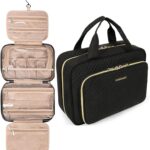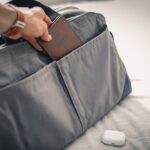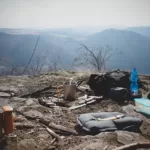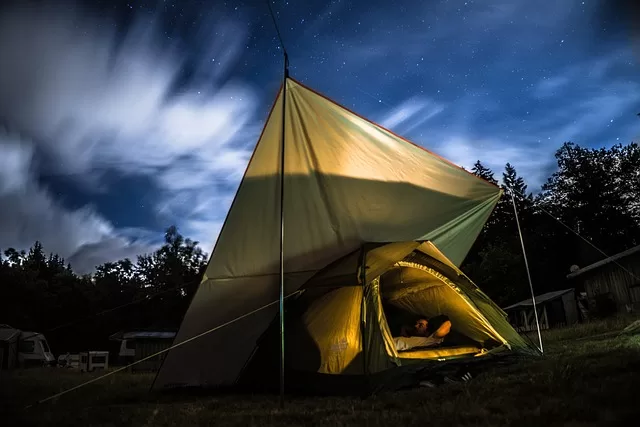Even if camping is an amazing way to disconnect from the physical and mental chaos of life, enjoy some peace and solitude, as well as explore tasking fun adventures, it is actually your responsibility to ensure you stay safe and comfortable while at it. Staying safe and comfortable while camping is paramount, whether as a newbie or a pro camper. To ensure you stay safe and comfortable enough to enjoy your camping trip, it is important to know how to prepare for camping by planning, getting your camping gear and equipment set, and actually executing the trip.
This guide provides essential tips and advice on how to stay safe and comfortable while camping to appreciate nature’s beauty and explore all the camping games and other adventures.
Planning for the Trip
Staying safe and comfortable while camping requires you to plan your camping trip. Planning for your camping trip involves choosing the right campsite, checking the weather conditions, and creating a comprehensive camping packing list, to ensure that your camping trip is safe and comfortable.
Choosing a Campsite
- When choosing a campsite, consider the location, accessibility, and amenities available.
- Look for a site that is level, well-drained, and away from potential hazards such as dead trees or water sources prone to flooding.
- Take into account the level of privacy and noise as well, as some campsites may be more secluded than others.
- Research the campsite’s policies on fires, pets, and food storage to ensure you comply with their regulations.
- Look for campsites that offer amenities such as restrooms, showers, and fire pits.
- Consider the weather conditions of the area where you will be camping.
Checking Weather Conditions
- Before setting off on your trip, be sure to check the weather forecast for the area you will be camping in.
- Pack appropriate clothing and gear based on the expected weather conditions, such as rain jackets, sun hats, and warm layers for colder nights.
- Be aware of any weather warnings or alerts, and consider delaying or rescheduling your trip if necessary.
- Avoid camping in areas that are prone to flooding or extreme weather conditions.
Creating a Packing List
- Creating a packing list is crucial for staying organized and ensuring you have all the necessary gear and supplies for your camping trip.
- Consider the length of your trip, the activities you plan to do, and the weather conditions when making your list.
- Some essential items to include on your packing list are a tent, sleeping bags and pads, cooking supplies, food and water, a first aid kit, and insect repellent.
- Remember to also bring along any personal items you may need, such as medications or toiletries.
- Pack appropriate clothing and footwear for the weather conditions you may encounter.
- Consider bringing extra batteries, a flashlight, and a portable phone charger for emergency situations.
Setting Up Camp
Now that you’ve chosen your perfect campsite, it’s time to set up camp! Setting up camp like a pro involves certain steps and a level of efficiency. The essential steps for setting up camp in order to stay safe and comfortable include pitching a tent like a pro, building a perfect campfire, and knowing how to Keep Your Food Fresh and Your Drinks Cold While Camping.
Setting Up Tents
- Choose a level, well-drained area to pitch your tent.
- Lay a tarp or groundsheet underneath your tent to protect it from moisture and punctures.
- Follow the instructions for setting up your tent, ensuring that all poles are securely in place and that the rainfly is properly attached.
- Consider using guylines and stakes to stabilize your tent in windy conditions.
- Keep the inside of your tent clean and organized to prevent tripping hazards and ensure a comfortable sleeping environment.
Building a Campfire
- Check the campsite’s policies on fires and follow all regulations.
- Choose a safe location for your fire, away from trees, dry grass, and other flammable materials.
- Clear an area around the fire pit of any debris or combustible materials.
- Use only small sticks and dry leaves to start your fire, and gradually add larger logs as it grows.
- Never leave a fire unattended, and be sure to fully extinguish it before leaving or going to bed. Check out these useful tips for campfire safety to guide you.
Storing Food Properly
- Store all food and garbage in airtight containers or bear-resistant canisters to prevent attracting wildlife to your campsite.
- Keep food away from sleeping areas and out of reach of animals.
- Consider using a separate cooler for perishable items and packing non-perishable foods that don’t require refrigeration.
- Remember to pack all necessary utensils, cookware, and a stove if you plan to cook meals at your campsite.
Staying Safe
When you’re out in the wilderness, safety should always be your top priority. While camping is a great way to enjoy the great outdoors, it’s important to know how to stay safe while camping by taking steps to protect yourself from potential hazards. Here are essential tips for staying safe while camping, including how to prepare a first aid kit, avoid dangerous wildlife, maintain a safe campfire, and keep your campsite clean and hazard-free.
First Aid Kit
- A well-stocked first aid kit is an essential item for any camping trip and should include items such as bandages, antiseptic, pain relievers, and insect repellent.
- Consider any personal medications you may need, and ensure they are included in the kit.
- Familiarize yourself with how to use the items in the kit before you leave for your trip. Here is the ultimate camping first aid and emergency checklist to follow.
Knowing the Wildlife
- Research the wildlife in the area you will be camping in and familiarize yourself with their behavior.
- Keep a safe distance from any animals you may encounter, and never attempt to feed or approach them.
- Store all food and garbage in airtight containers or bear-resistant canisters to prevent attracting animals to your campsite.
- If you encounter a bear or other dangerous animal, make noise and try to appear larger by waving your arms or holding a jacket or backpack above your head.
Maintaining a Safe Campfire
- Check the campsite’s policies on fires and follow all regulations.
- Choose a safe location for your fire, away from trees, dry grass, and other flammable materials.
- Clear an area around the fire pit of any debris or combustible materials.
- Use only small sticks and dry leaves to start your fire, and gradually add larger logs as it grows.
- Never leave a fire unattended, and be sure to fully extinguish it before leaving or going to bed.
Keeping a Clean Campsite
- Maintaining a clean campsite is crucial for staying safe and comfortable while camping. You should always opt for an eco-friendly camping trip and lifestyle.
- Dispose of all garbage and food waste properly, using designated trash receptacles or packing it out with you.
- Keep cooking and eating areas clean to prevent attracting animals.
- Use a designated area for washing dishes and disposing of gray water.
- Practice good hygiene to prevent the spread of germs, wash hands frequently and use hand sanitizer when necessary.
- Inspect your campsite regularly for hazards such as sharp rocks or tree limbs, and address them promptly to prevent accidents.
Tips for Staying Comfortable while Camping
While staying safe is the most important consideration while camping, it’s also essential to be comfortable in order to fully enjoy your trip. Check out these tips and advice for staying comfortable while camping, including proper camping clothing and apparel, footwear, toiletries, insect repellent, sunscreen, sleeping arrangements and gear, and camping food and drinks. With these essential items and tips, you’ll be able to stay comfortable and relaxed while enjoying the great outdoors.
Choose Proper Clothing and Footwear
- Choose clothing made from moisture-wicking materials to keep you dry and comfortable.
- Bring multiple layers to adjust for changing temperatures throughout the day.
- Wear comfortable and supportive footwear suitable for hiking and other outdoor activities.
Pack The Right Toiletries
- Bring the essential camping toiletries only, including a toothbrush and toothpaste, soap, shampoo, and toilet paper.
- Consider bringing a towel or washcloth for cleaning up.
Bring Along Insect Repellent and Sunscreen
- Apply insect repellent to prevent bites from mosquitoes, ticks, and other pests.
- Use sunscreen to protect your skin from harmful UV rays.
- Reapply both insect repellent and sunscreen as necessary throughout the day.
Set Up Your Sleeping Arrangements and Gear
- Choose a high-quality tent with proper ventilation to keep you cool and comfortable while you sleep.
- Bring a warm sleeping bag and sleeping pad to provide insulation and cushioning.
- Consider bringing a pillow or other comfort items to help you sleep better.
Pack Camping Food and Drinks
- Plan out your meals ahead of time to ensure you have enough food for your entire trip.
- Pack non-perishable foods that are easy to prepare, such as trail mix, granola bars, and canned goods.
- Bring a stove and fuel to cook hot meals if desired.
- Don’t forget to pack plenty of water and other beverages to stay hydrated throughout your trip. Consider bringing a water filter or purification tablets if you plan to drink from natural sources.
Tips for Staying Safe and Comfortable While Doing Outdoor Activities
Outdoor activities like hiking, water sports, land sports, and wildlife watching can be exciting and enjoyable, but it’s important to prioritize safety and comfort while you’re out in nature. Here are some essential tips and advice on how to stay safe and comfortable while camping and doing outdoor activities.
Hiking and Backpacking Safety
- Plan your route ahead of time and let someone know your itinerary.
- Bring a map, compass, and GPS device or smartphone with offline maps.
- Wear proper footwear and clothing for the terrain and weather conditions.
- Bring plenty of water and food, as well as a first aid kit and emergency supplies.
- Be aware of your surroundings and watch for potential hazards such as unstable terrain, steep drop-offs, and wildlife.
- Take breaks and rest when needed to avoid exhaustion and dehydration.
- Follow Leave No Trace principles to minimize your impact on the environment.
Water Safety
- Wear a properly fitting life jacket when participating in water activities such as boating, kayaking, and canoeing.
- Be aware of water conditions such as currents and waves, and check weather forecasts before heading out.
- Avoid swimming alone or in areas with strong currents or hidden underwater hazards.
- Never dive headfirst into unknown bodies of water.
- Follow local regulations for fishing and other water activities.
Wildlife Watching and Photography
- Keep a safe distance from wildlife and never approach or feed them.
- Use binoculars or a telephoto lens for close-up views of animals.
- Be aware of the risks associated with different types of wildlife, such as bears or snakes.
- Respect wildlife habitats and avoid disturbing their natural behaviors.
- Follow local regulations and guidelines for wildlife watching and photography.
Outdoor Sports
- Choose a suitable and safe location for your chosen sport, such as a designated climbing area or bike trail.
- Wear appropriate protective gear such as helmets and pads for activities like biking, climbing, and skateboarding.
- Follow proper techniques and instructions for your sport, and seek training if necessary.
- Warm up properly and take breaks when needed to avoid injury and fatigue.
- Bring plenty of water and snacks to stay fueled and hydrated.
- Be aware of your surroundings and watch for potential hazards such as rocks, roots, or other obstacles.
- Keep a first aid kit, and emergency supplies on hand.
Leaving the Campsite Safe and Comfortable
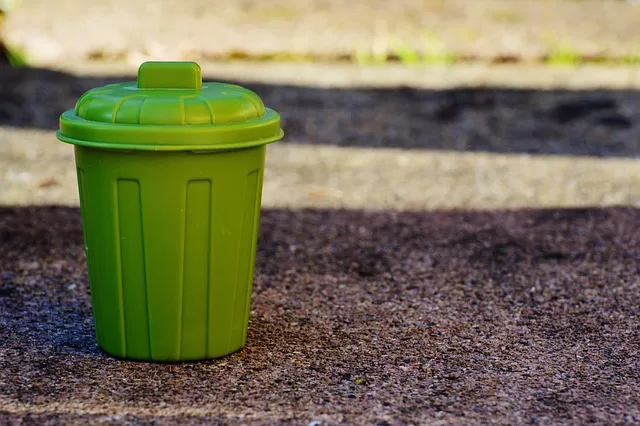
In order to leave the campsite safe and comfortable for both yourself and future campers, it’s important to properly dispose of waste, take down your tent, and check for any lost items. Here are some important tips for leaving the campsite in a responsible and sustainable manner.
Properly Disposing of Waste
- Collect all garbage and dispose of it in the designated area or carry it out with you.
- Pack out all used toilet paper and feminine hygiene products in sealed bags.
- Use biodegradable soap at least 200 feet from any water source when washing dishes or yourself.
- Avoid using disposable plates, cups, and utensils, and bring reusable options instead.
Taking Down Tents and Leaving No Trace
- Pack up all gear, including the tent, stakes, and guylines, and leave the campsite as you found it.
- Take down any temporary structures such as clotheslines, flagpoles, or hammocks.
- Rake over any disturbed soil and naturalize your impact on the area.
- Do not damage or remove any natural objects such as rocks or plants.
Checking for Lost Items
- Double-check the campsite and surrounding area for any lost items such as sunglasses, utensils, or personal belongings.
- Make sure no food or garbage is left behind that could attract animals to the campsite.
- Check the fire pit for any embers or ash that need to be fully extinguished before leaving.
Conclusion
Camping is an enjoyable and fulfilling experience, but it’s important to prioritize safety and comfort while you’re out in the wilderness. By following these essential tips and advice for staying safe and comfortable while camping, you can ensure that your camping trip is a success. From planning and preparing for camping like choosing a campsite, checking weather conditions, and creating a packing list, to how to set up camp when you arrive at your campsite, like setting up tents, building a campfire, and storing food properly.
Don’t also forget to look out for the environment as much as you look out for yourself, pack up a first aid kit, be aware of local wildlife, and how to keep a clean campsite. Of course, staying comfortable while camping is important too, wear proper clothing and footwear, pack up your toiletries, insect repellent, and sunscreen, set up your sleeping arrangements and gear, and bring along healthy camping food and drinks. Don’t forget the importance of leaving the campsite safe and comfortable for the next camper by properly disposing of waste, taking down your tent, and checking for any lost items.





